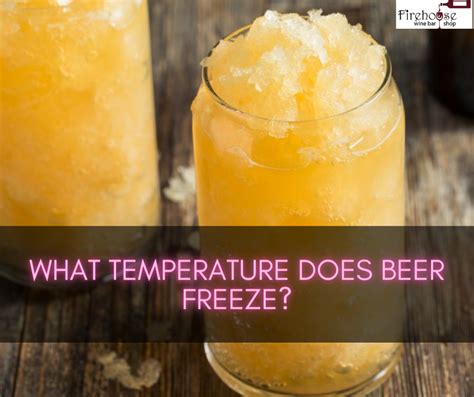Beer is a popular beverage enjoyed by many around the world. However, have you ever wondered what temperature beer freezes at? The answer might surprise you. In this article, we'll delve into the world of beer and explore the temperature at which it freezes.
Factors Affecting the Freezing Point of Beer
Before we dive into the specifics, it's essential to understand that the freezing point of beer is influenced by several factors. The primary factors that affect the freezing point of beer are:
- The type of beer: Different types of beer have varying levels of water content, sugars, and other solutes, which impact the freezing point.
- The ABV (Alcohol by Volume): Beers with higher ABV tend to have a lower freezing point due to the presence of more alcohol.
- The presence of additives: Some beers may contain additives like glycerin or other ingredients that can affect the freezing point.

The Freezing Point of Beer
The freezing point of beer is typically lower than that of water, which freezes at 32°F (0°C). The exact freezing point of beer depends on the factors mentioned above. However, as a general rule, most beers will start to freeze at around 25°F (-4°C) to 28°F (-2°C).
- Lager beers tend to freeze at a slightly higher temperature, around 26°F (-3°C) to 28°F (-2°C).
- Ale beers, on the other hand, tend to freeze at a slightly lower temperature, around 24°F (-4°C) to 26°F (-3°C).
- Beers with higher ABV (above 8%) may freeze at an even lower temperature, around 20°F (-7°C) to 24°F (-4°C).
It's worth noting that beer will not freeze solid like water. Instead, it will form a slushy, icy mixture due to the presence of sugars, acids, and other solutes.

Why Does Beer Freeze at a Lower Temperature?
Beer freezes at a lower temperature than water due to the presence of dissolved solids and other solutes. These solutes, such as sugars, acids, and salts, disrupt the formation of ice crystals, making it more difficult for the beer to freeze.
Additionally, the presence of alcohol in beer also contributes to the lower freezing point. Alcohol is a solvent that can dissolve and disrupt the formation of ice crystals, making it harder for the beer to freeze.
Practical Applications
Understanding the freezing point of beer can have practical applications in various industries, such as:
- Beer storage and transportation: Knowing the freezing point of beer can help brewers, distributors, and retailers store and transport beer more effectively.
- Beer production: Understanding the freezing point of beer can help brewers optimize their brewing processes and prevent spoilage.
- Beer serving: Knowing the freezing point of beer can help bartenders and servers optimize the serving temperature of beer to ensure the best flavor and quality.

Conclusion
In conclusion, the freezing point of beer is influenced by various factors, including the type of beer, ABV, and presence of additives. Most beers will start to freeze at around 25°F (-4°C) to 28°F (-2°C), although the exact temperature may vary. Understanding the freezing point of beer can have practical applications in various industries, from beer storage and transportation to beer production and serving.

Final Thoughts
Whether you're a beer enthusiast or a professional in the brewing industry, understanding the freezing point of beer can help you appreciate the complex science behind this beloved beverage. So next time you're enjoying a cold beer, remember the science that goes into making it possible.






What temperature does beer freeze at?
+Beer typically freezes at around 25°F (-4°C) to 28°F (-2°C), although the exact temperature may vary depending on the type of beer, ABV, and presence of additives.
Why does beer freeze at a lower temperature than water?
+Beer freezes at a lower temperature than water due to the presence of dissolved solids and other solutes, such as sugars, acids, and salts, which disrupt the formation of ice crystals.
What are the practical applications of understanding the freezing point of beer?
+Understanding the freezing point of beer can have practical applications in various industries, such as beer storage and transportation, beer production, and beer serving.
